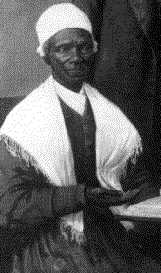Readings:
Wisdom 5:15–20
Psalm 126
Mark 4:21–29Preface of Baptism
PRAYER (traditional language):
Almighty God, who hast made thy Church to be one body with many members and many gifts: we thank thee for the witness of thy daughter, Sojourner Truth, and for her courage to preach the truth of thy liberating love in the face of great injustice. Grant that we, like her, may use our time, talents, and energy to proclaim the coming of thy Kingdom, which is good news to the poor, and in which all the oppressed shall be made free; through Jesus Christ our Lord, who liveth and reigneth with thee and the Holy Ghost, one God, for ever and ever. Amen.
PRAYER (contemporary language):
Almighty God, who has made the Church to be one body with many members and many gifts: we thank you for the witness of your daughter, Sojourner Truth, and for her courage to preach the truth of your liberating love in the face of great injustice. Grant that we, like her, may use our time, talents, and energy to proclaim the coming of your Kingdom, which is good news to the poor, and in which all the oppressed shall be made free; through Jesus Christ our Lord, who lives and reigns with you and the Holy Spirit, one God, for ever and ever. Amen.
This commemoration appears in Lesser Feasts & Fasts 2018.
Return to Lectionary Home Page
Webmaster: Charles Wohlers
SOJOURNER TRUTH:
LIBERATOR AND PROPHETIC WITNESS, 26 NOV. 1883
 Sojourner
Truth, originally known as Isabella, was born a slave in New York in about
1798. In 1826 she escaped with the aid of Quaker Abolitionists, and became
a street-corner evangelist and the founder of a shelter for homeless women.
When she was travelling, and someone asked her name, she said "Sojourner,"
meaning that she was a citizen of heaven, and a wanderer on earth. She
then gave her surname as "Truth," on the grounds that God was her Father,
and His name was Truth. She spoke at numerous church gatherings, both
black and white, quoting the Bible extensively from memory, and speaking
against slavery and for an improved legal status for women. The speech
for which she is best known is called, "Ain't I a Woman?" It was delivered
in response to a male speaker who had been arguing that the refusal of
votes for women was grounded in a wish to shelter women from the harsh
realities of political life. She replied, with great effect, that she
was a woman, and that society had not sheltered her. She became known
as "the Miriam of the Latter Exodus."
Sojourner
Truth, originally known as Isabella, was born a slave in New York in about
1798. In 1826 she escaped with the aid of Quaker Abolitionists, and became
a street-corner evangelist and the founder of a shelter for homeless women.
When she was travelling, and someone asked her name, she said "Sojourner,"
meaning that she was a citizen of heaven, and a wanderer on earth. She
then gave her surname as "Truth," on the grounds that God was her Father,
and His name was Truth. She spoke at numerous church gatherings, both
black and white, quoting the Bible extensively from memory, and speaking
against slavery and for an improved legal status for women. The speech
for which she is best known is called, "Ain't I a Woman?" It was delivered
in response to a male speaker who had been arguing that the refusal of
votes for women was grounded in a wish to shelter women from the harsh
realities of political life. She replied, with great effect, that she
was a woman, and that society had not sheltered her. She became known
as "the Miriam of the Latter Exodus."
by James Kiefer